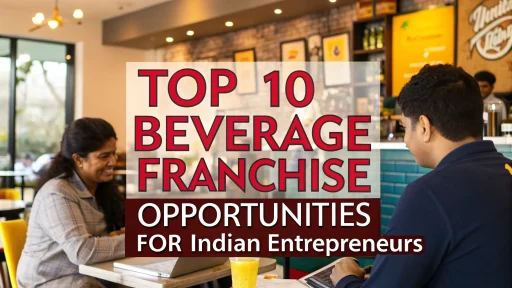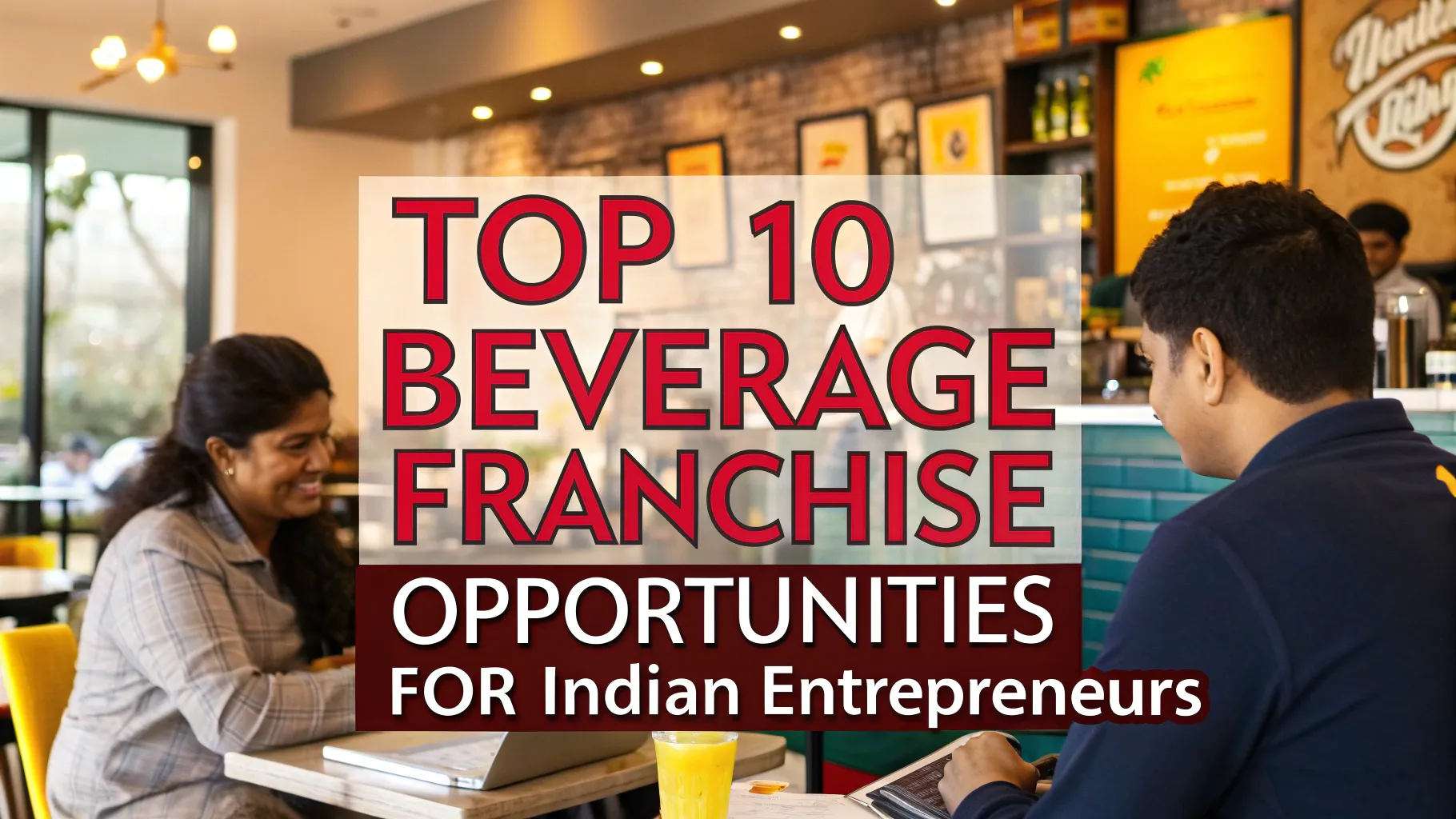The Rise of Beverage Franchising In India
India’s beverage franchise market is experiencing a transformation due to changing consumer tastes, urbanization, and the growing demand for branded and health-conscious options. Indians are increasingly looking for ready-to-consume drinks that fit their lifestyle, whether it is artisanal coffees, herbal teas to boost immunity, or smoothies rich in nutrients. Organized franchise models fill this gap by offering standardized, scalable offerings.
Beverage franchising is a great way for startups and aspiring entrepreneurs to enter this high-demand sector in high demand without having to create a new brand or product. Franchisees can benefit from tested formats, established supply chains, marketing support, and operational training. Not all beverage franchises offer the same experience. Some are designed to provide a premium café experience, while others are functional grab-and-go models that are suitable for Tier 2 or Tier 3 cities.
This article explores the top 10 franchise opportunities in India’s beverage space, backed by market trends, manufacturing insights, and growth forecasts–empowering founders with actionable insights to make informed business decisions.
India’s Beverage Market Outlook: Demand, Trends and Forecast (2025-2030)
In 2025, the non-alcoholic beverages sector in India, which includes tea, coffee, and dairy-based drinks as well as cold-pressed juices, carbonated drinks, smoothies and health drinks, will be valued at Rs6.5 lakh. The sector is expected to grow by 8.5% CAGR, and reach nearly Rs 10 lakh billion by 2030. Urban consumption, organized retail, e-commerce, and changing consumer lifestyles are driving this expansion.
The consumer has moved away from carbonated, sugary drinks and towards healthier alternatives. Trends include natural ingredients, plant-based formulas, immunity boosters, and premium coffee experiences. Urban millennials, Gen Z, and Gen X aren’t just drinking to refresh themselves; they want wellness, identity, and experience. This changing dynamic has created space for diverse franchise formats.

1. Chaayos: Reinventing India’s tea habit
Chaayos is a successful blend of tradition and convenience. Brand identity was built around customized chai, which allowed consumers to choose everything from spice blends to sweetness levels. Chaayos offers a wide variety of teas, snacks, and seasonal drinks.
Chaayos’s operational model is what makes it so attractive as a franchisor. These outlets are usually mid-sized and located in high-traffic areas such as malls, airports or other busy places. The brand offers entrepreneurs a data-driven design of its menus, digital ordering systems, and customer loyalty programs. The company controls the sourcing of ingredients and manufactures pre-mixes to ensure consistency in taste and supply.
Related: Aluminium Can For Beverages : A High-Margin, Low-Waste Business Model for Emerging Markets
2. Third Wave Coffee: Premium Artisanal coffee with Scalable Appeal
Third Wave Coffee, one of India’s few in-house brands, is a brand that caters to the growing specialty coffee market. The brand sources beans of high quality from Indian estates and uses advanced brewing techniques like cold brew, Chemex, and pour-over to prepare its beverages. The aesthetics and ambiance are designed to appeal to India’s young, upwardly mobile professionals.
Franchisees can take advantage of a comprehensive support system, including barista education, menu rotations, technology integrations and seasonal promotions. The brand is primarily focused on metro areas today, but its model can expand to Tier 2 towns where premium coffee culture has not yet emerged. The central management of the backend packaging and roasting facilities simplifies logistics, and improves quality control.
3. Amul Parlours: Dairy-Driven Drinks with Built-In Customer Demand
Amul is India’s most trusted brand of dairy products. Its retail parlours offer milkshakes, flavored lasses, packaged beverages, ice cream, and snacks. Amul’s huge brand recognition, price advantage, and pan-India presence make it an excellent franchise opportunity for new entrepreneurs.
Manufacturing facilities of the company are modern and distributed across several regions to ensure efficient supply. Amul’s cold chain is already established, and its product training and innovation are regular. This reduces risk for franchisees. This model is ideal for businesses that target families, schools, and public areas.
4. Smoothies for a Health-Conscious Generation
Drunken Monkey came to India with the mission of offering real fruit smoothies, without artificial sweeteners or additives. The brand is energetic and youthful with a focus on convenience and health. It is a healthy, delicious alternative to fast food for gym-goers and professionals.
The compact format of its franchise operations is a good fit for small spaces. The drinks are formulated centrally, and the raw fruit pulps are distributed via an integrated supply chain. This franchise model was designed to provide quick service and moderate investment in urban locations. It is a good choice for entrepreneurs who are health-conscious.
5. MBA Chai Wala: Viral Growth through an Entrepreneurial Story
MBA Chai Wala, founded by a former college dropout who became an entrepreneur is more than a tea franchise. It’s now a brand that’s built around narrative and digital storytelling. These outlets offer a variety of teas, including traditional chai and fusions, as well as snack platters. They are located in places like IT parks, educational zones and high streets.
The content-first marketing model and the community engagement model are what distinguish MBA Chai Wala. Franchisees receive training not only in customer service but also in storytelling and community engagement. The central unit supplies the brand’s proprietary ingredients and premixes, which ensures consistency across all franchises.
Related: How to Start Manufacturing Business of Aluminium Cans for Beverages
6. Hocco – From Ice Cream to Milkshake Lounges
In particular, Hocco is a spin-off of the Havmor brand. It offers a franchise centered around milkshakes and dairy drinks. Consequently, this model is best suited to Tier 1 and 2 cities, where there is a growing demand for air-conditioned dessert cafés that are family-friendly.
To begin with, Havmor already has a dairy infrastructure that can be used to produce the beverages. As a result, franchisees benefit from optimized supply chains and shelf life. Furthermore, the brand’s manufacturing strength lies in its high-quality ice cream bases and automated blender systems for its shakes.
7. Raw Pressery: Cold-Pressed Fruit Juices for Retail and Kiosk Formats
Raw Pressery was the first to introduce cold-pressed juices in India. Although largely D2C at its inception, the company has now piloted retail counters led by franchises in airports, gyms, and wellness spaces. The company’s products are popular with urban fitness-conscious consumers because they focus on immunity, energy, and detox.
To operate effectively, Raw Pressery franchisees must be familiar with cold chain management. Specifically, the juices are produced in high-end cold presses and must be transported at a constant temperature. Moreover, the brand is in charge of logistics and shelf life tracking to ensure operational ease.
8. Blue Tokai Coffee – Craft Coffee Experience with Roastery
Blue Tokai is at the intersection of coffee expertise and retail engagement. The outlets are cafes, retail shops, and educational spaces for coffee lovers. The company roasts its beans in its central facility and sources directly from Indian plantations, allowing it to control the quality and flavor.
Blue Tokai franchisees can enjoy a refined customer experience, as well as multiple revenue streams, including drinks, beans, brewing equipment, and workshops. The logistics and manufacturing are centralized to simplify the back end for franchisees while providing a premium brand.
9. Juice Lounge – Mass Market Juice Bars With Modular Setup
Additionally, Juice Lounge has a long-standing brand in the space of fresh juices and smoothies, and is known for its variety and affordability. It is located in malls and hospitals as well as transit hubs. Its format is quick-service and simple. It’s suited to locations with high footfall, but also a preference for healthy refreshments.
Semi-automatic beverage franchise preparation is done with predefined mixes and hygienic protocols. The central team is responsible for quality control and procurement, while franchisees are provided with supply kits. Juice Lounge offers a low-barrier way to enter the beverage market.
10. Patanjali – Herbal Beverages Rooted in Ayurveda
Patanjali’s beverage division includes herbal waters and concoctions flavored with Ayurveda, as well as aloe vera drinks, immunity drinks based on giloy, and aloe juices. Furthermore, the company already has a huge distribution network and is trusted by health-conscious consumers.
Patanjali’s franchise model includes food, beverages, and personal care products. Specifically, the beverages are manufactured at the integrated herb processing plants, using Ayurvedic formulas, quality tests, and natural preservatives. The franchisees enjoy nationwide marketing, as well as Ayurvedic appeal.
For more information, check out this video
Understanding the Manufacturing Process of Beverage Products
Understanding the backend beverage franchise process can be valuable for entrepreneurs, especially those who are interested in private label, regional bottling or white-label manufacturing.
The manufacturing process involves:
- Source of Raw Ingredients: Such as sweeteners, flavors, water, tea or coffee, and fruit pulps. These ingredients must meet FSSAI and BIS Standards.
- Mixing & Formulation is a method of creating recipes using batching systems. Proper ratios ensure consistency across batches.
- Pasteurization or UHT Treatment depends on shelf life and the type of product. This reduces the risk of microbial contamination and preserves freshness.
- Packaging Tetra Paks or PET bottles, or in glass. The majority use automatic bottling units with sterilization.
- Labeling and batch coding are followed by climate-controlled distribution and storage logistics.
To maintain the integrity of products, manufacturing facilities are equipped with RO purification units. They also have blending tanks and automated filling machines.
NPCS’s Support for Aspiring Entrepreneurs
Niir Project Consultancy Services offers deep expertise on industrial project reports, startup guidance, and other services.
- To begin with, NPCS produces Market Reports and Detailed Techno-Economic Feasibility (DPRs) to assess the potential for setting up new industries.
- Moreover, these reports cover raw materials, machine selection, plant layout, and financial projections.
- Additionally, as a trusted industry partner, NPCS assists MSMEs, entrepreneurs, and startups in evaluating technical and economic feasibility for launching beverage-based enterprises throughout India.
Which business to start? How to choose a business idea?
Conclusion – Choosing the right franchise path in India’s beverage boom
India’s beverage industry is dynamic, growing fast, and becoming more organized. Moreover, the opportunities are vast, ranging from regional chai brands to premium coffee brands, health-based drinks, and even health-based juices. As a result, franchise models are a quick way to gain credibility, access to markets, and operational expertise.
Beverage franchise are more than a retail venture for Indian entrepreneurs who want to enter the F&B industry. Moreover, they’re a scalable business rooted in evolving lifestyles, nutrition trends, and organized consumer behaviour.
Therefore, it is important to select the right beverage franchise partner and understand the backend process. Furthermore, market insights can be used to scale and localize the business.In conclusion, your franchise journey can be a success with strategic planning, industry mentorship, and technical guidance.








